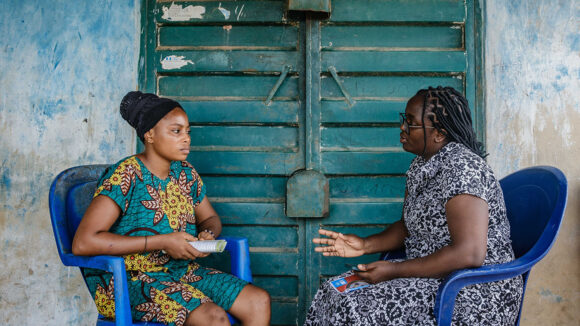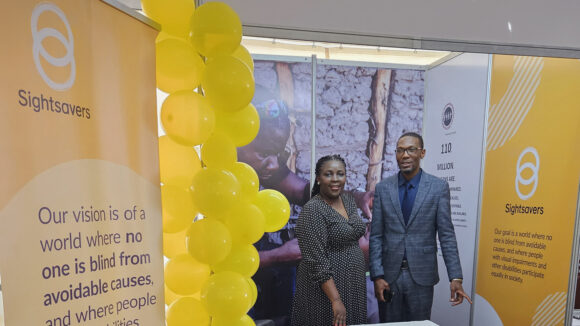NOTE: This article is more than five years old, but may still be relevant. For more recent content, see our news and blogs page.
Imagine this: your child comes home from school one day with itchy, sticky eyes. What do you do? You take them to your local clinic to get their eyes checked and make sure they’re OK.
When you get there you see a health worker who tells you that your child has a trachoma infection (a type of conjunctivitis) – but that they can prescribe medicine to treat the eye infection, so not to worry.
Simple, right? But let’s think about what this scenario assumes: that you have a local health centre you can reach from your home that’s equipped to respond to your family’s needs; that the health centre is staffed by well-trained, motivated health workers; that they’re able to diagnose the infection and treat your child. It also assumes that the antibiotics needed to treat your child’s eye infection are safe, affordable and available. In short, it’s a universal health coverage approach.
What is universal health coverage (UHC)? It’s the most powerful concept public health has to offer. UHC is about ensuring that people can access the health care they need, when they need it, where they need it and in a way that means they don’t risk financial catastrophe by doing it. As well as this, it specifically targets ‘priority populations’ – vulnerable and marginalised groups, often the same populations who live in areas at risk for trachoma.
That’s why we’re welcoming the World Health Organization report, Investing to Overcome the Global Impact of Neglected Tropical Diseases, launched today. It addresses the need for the NTD response to understand what universal health coverage means in the context of NTDs and sets clear targets for action and investment to deliver this vision.
Delivering universal health coverage is a bigger challenge than any one disease response can tackle alone as we can’t achieve UHC without stronger health systems. In fact, support for UHC mandates a health system strengthening response.
Health systems in countries endemic for NTDs like trachoma are among the most fragile in the world, so this shift faces the dilemma that such services are often not strong enough to absorb this function without dedicated efforts to support them.
But we know that strong health systems are critical not only to delivering on universal health coverage but also to maximising the impact of current health investments such as those to combat NTDs. Equally, the lack of robust, effective and well-resourced health systems in developing countries threatens to compromise the effectiveness of health programmes on improving health outcomes and on sustaining elimination once it is reached.
Today, millions of people around the world are still at risk of blindness from the complications caused by repeat trachoma infections. In many countries where Sightsavers is focusing efforts to eliminate blinding trachoma, we’re working in a context of weak and often fragmented health systems.
We’re working with national governments to eliminate blinding trachoma by 2020 but as we do this, we know that our response to this disease will need to evolve. For example, as the spread of trachoma is reduced, there will be fewer and fewer cases, so on efficiency grounds, detection and treatment activities need to be absorbed by the national health service infrastructure.
Trachoma is just one of the many conditions national health systems in developing countries need to be able to respond to. In many cases, the same people at risk of trachoma may also be at risk of malaria, HIV/AIDS, diabetes, heart disease, TB, mental health problems… you get the picture. Accordingly, we need to support health systems in developing countries to develop so that they are equipped to meet those multiple demands, ensuring that families and communities can access the services they need without risking financial ruin by doing so. To do this in the longer term, we need to future-proof health services, by strengthening national health systems so that they are equipped to deliver high quality care – and respond to new challenges.
To succeed in delivering universal health coverage, and to respond effectively to future health challenges (such as sustaining the achievement of elimination of blinding trachoma), health systems need to be supported to become efficient, effective, integrated and informed.
The latest WHO report sets out a clear call to action on this, supported by a pathway to understand what is needed to deliver this – and importantly, how much will need to be invested to deliver it.
Investment in a health system strengthening approach is a win-win for NTDs and for the multitude of health needs developing country health systems face, in terms of both impact for current investments and sustainability. Developing health systems to be robust yet responsive, equipped to deliver services that are financially fair yet comprehensive, and that prioritise equity alongside quality, can only be a good thing.
By Helen Hamilton, Policy Adviser at Sightsavers
“Universal health coverage ensures people can access the care they need”
Want to read more about our work?
Neglected tropical diseases
Why community collaboration is important in our research
Our research on female genital schistosomiasis has highlighted the need to establish a safe and supportive environment for participants when studying sensitive topics.

The key to inclusive education is engaging organisations of people with disabilities
Collaborating with organisations of people with disabilities (OPDs) on our inclusive education projects has earned the Sightsavers-led Inclusive Futures consortium a Zero Project Award in 2024.

Six takeaways from the International Conference for Public Health in Africa
Sightsavers’ Hortance Manjo shares insights from the event in Zambia, which highlighted eye health for the first time.